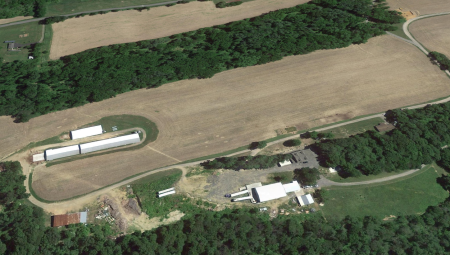Human trafficking lawsuit claims Mennonite teens suffered mental and physical abuse on farm

The Eastern Pennsylvania Mennonite Church and associated entities have been accused in a federal lawsuit of exploiting and abusing Mennonite boys and young men through a program they claimed would reform “troubled boys” but caused them physical and mental harm instead.
The Eastern Pennsylvania Mennonite Church is a regional Conservative Mennonite group with several dozen congregations and several thousand adherents in Pennsylvania and surrounding states.
The lawsuit filed earlier this month alleges that through their actions, the church, its mission, the Liberty Ridge Farm and farm owner Nelson Martin violated the federal Trafficking Victims Protection Act, the Racketeering in Corrupt Organizations Act and a Pennsylvania human trafficking law.
The lawsuit was filed by two men who were 14 and 18 when they were sent to Liberty Ridge Farm, which operates a home for Mennonite boys and young adult members of the church in Juniata County.
The filing claims the boys worked six days per week without pay and at times, were forced to perform labor-intensive work “with limited-to-no food and/or water for extended periods of time.”
“Some consequences included, but were not limited to, dragging chains over their
shoulders, breaking boulders into tiny pieces by hand with a small hammer, and digging out
stumps by hand,” the lawsuit reads. “Other times, the Mentors would physically restrain the Residents, sometimes utilizing multiple Mentors to hold the residents face-down on the ground, restrain their arms and legs behind the Residents in a hog-tied position, utilize zip-ties to restrain the Residents, and even tie up the Residents and drag them.”
The Eastern Pennsylvania Mennonite Church could not be reached for comment.
Renee Franchi, who filed the lawsuit on behalf of the plaintiffs identified only as D.C. and J.D.M. for their protection, told The Morning Call that it is likely that many boys and young men were exploited after they were deemed “troubled” and had “special spiritual, emotional, and social needs” by the church. He said they were likely considered to be ripe candidates for the farm, which opened in 2011 and housed about six youths at a time.
“We believe it is likely that [there] were many boys and now men who were there and we strongly encourage them to come forward,” Franchi said. “There have been threats made by members of the church to at least one person involved in this case.”
A Pennsylvania Department of Human Services spokesperson told The Morning Call that there are no records of licensing involvement for Liberty Ridge Farm.
The two plaintiffs, who are now adults living in New Jersey and Missouri, said Liberty Ridge Farm charged their families $2,300 monthly for the support they did not receive.
According to the lawsuit, Liberty Ridge is approximately 80 acres and consists of “chicken houses, cattle and hog buildings, fences, gardens, woodlands, and a shop to build, in relevant part, wooden pallets and fiberglass fence gates.”
It also conducts business as both an intrastate and interstate freight shipping company.
The lawsuit alleges that D.C. was first placed at Liberty Ridge by the church in approximately 2011 when he was about 14. He remained there until about 2014, when he was approximately 17.
J.D.M., who along with his family was a member of the Eastern Pennsylvania Mennonite Church, was first placed at Liberty Ridge by the church in 2019, about two weeks after he turned 18. He stayed at the farm for 10 months.
The residents at the farm, as well as their families, were told that the program was “an intense spiritual atmosphere for the purpose of effecting social and behavioral changes in the lives of the troubled boys in a structured, closely supervised home-like setting,” the lawsuit said.
Instead of helping the residents of the farm, however, Liberty Ridge, under the umbrella of the church, “was running multiple profitable business ventures for Defendants, including but not limited to the farming of chickens, cattle, and hogs, building fences, gates, and wooden pallets, and a trucking company utilizing the unpaid labor of the residents.”
“Defendants retained all monies earned from the labor of the Residents,” the lawsuit states. At the same time, the farm made residents work “every day of the week except for Sundays with no days off.”
“At all relevant times, the general schedule at Liberty Ridge was that unless the residents were eating their meals, sleeping, studying the Bible, or performing their daily exercise, they were performing labor at Liberty Ridge,” the lawsuit stated.
Throughout their time at the farm, both D.C. and J.D.M. allegedly suffered physical and mental abuse.
“Defendants would threaten residents with abuse, including but not limited to … being excommunicated from the Church, and excommunicated from their families if they attempted to leave, or even just spoke of leaving, Liberty Ridge,” the lawsuit continues.
“Defendants even threatened residents with legal process if they attempted to leave, or even just spoke of leaving, Liberty Ridge. Defendants’ restraints, abuse, and threats against Residents, including Plaintiffs, were utilized by Defendants to force Residents to comply with Defendants’ demands, including forced labor for Defendants.”
The plaintiffs are seeking compensatory and special damages in an amount to be proven at trial along with unpaid wages, including minimum wages and overtime premiums. They are also demanding statutory penalties, liquidated damages, punitive and exemplary damages and reasonable attorneys’ fees and costs.





















